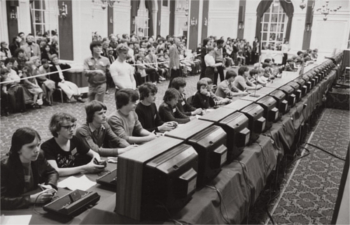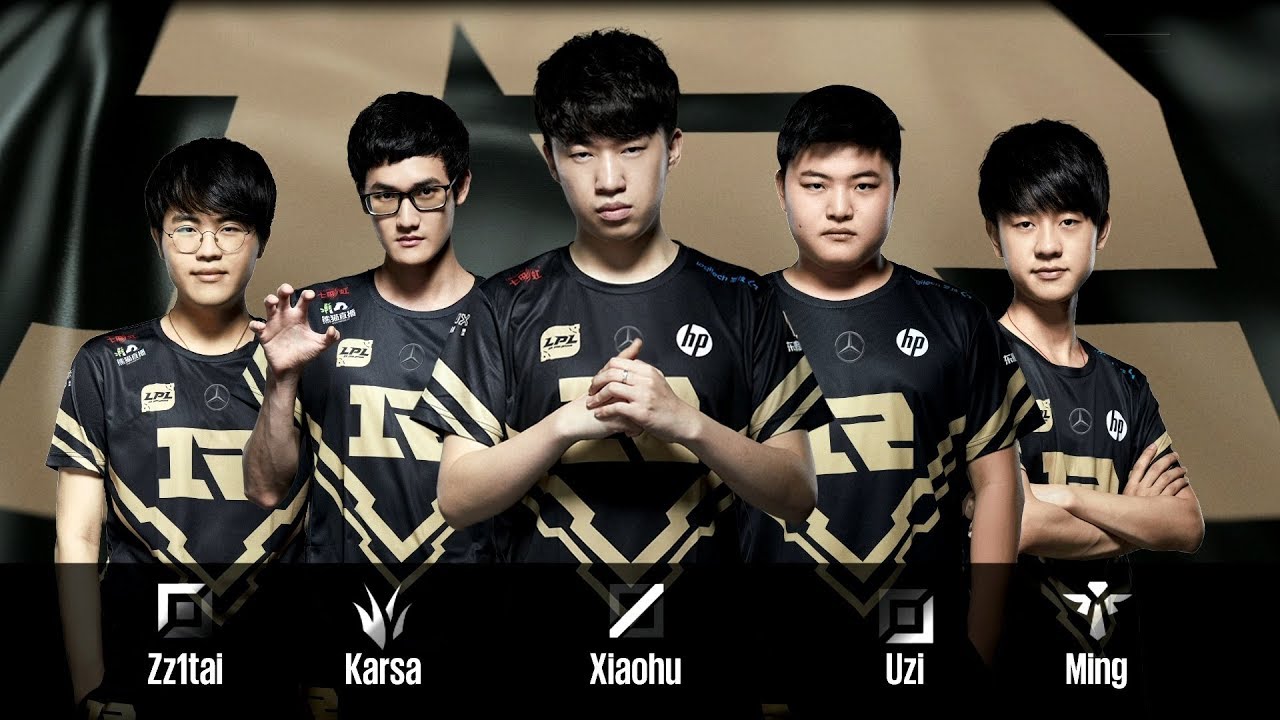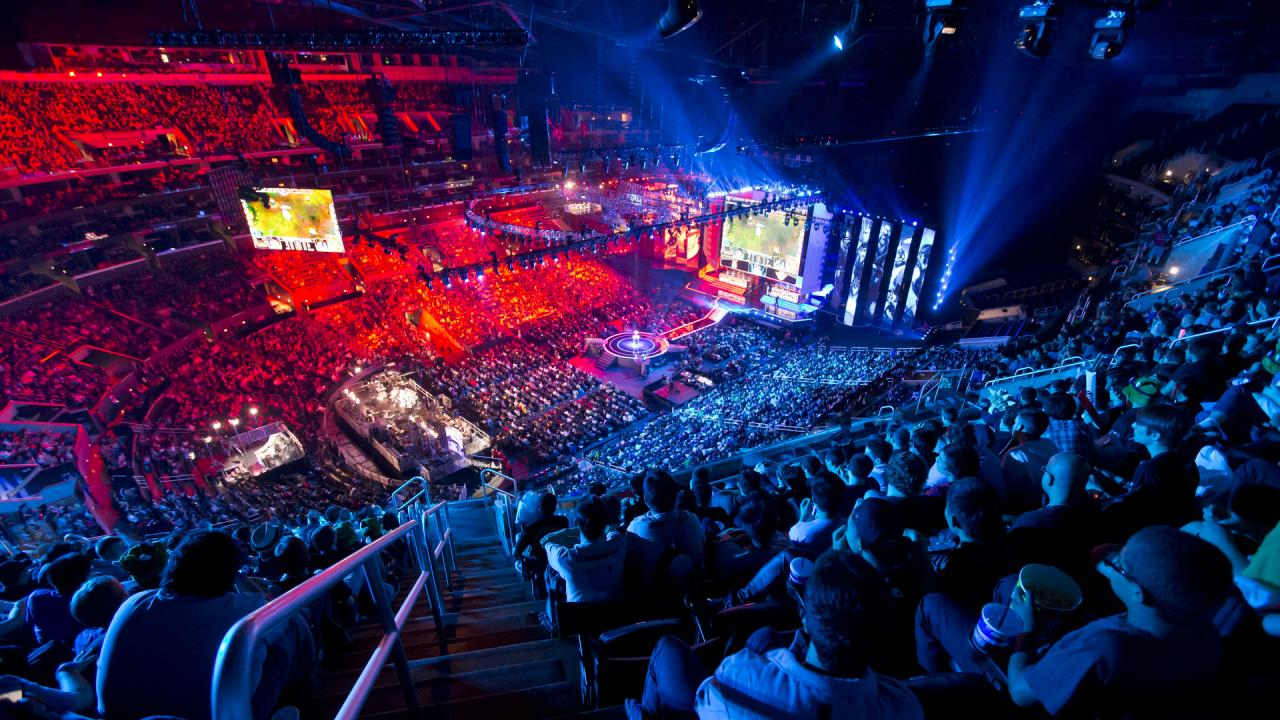History of The rise of E-sport
- Early history (1972–1989)
- Growth and online video games (1990–1999)
- Global tournaments (2000–present)
- Professional leagues
- Olympic Games recognition
- Games
- Tournaments
- Training
- Teams and associations
Early history (1972–1989)

The earliest known video game competition took place on 19 October 1972 at Stanford University for the game Spacewar. Stanford students were invited to an "Intergalactic spacewar olympics" whose grand prize was a year's subscription for Rolling Stone, with Bruce Baumgart winning the five-man-free-for-all tournament and Tovar and Robert E. Maas winning the Team Competition. The Space Invaders Championship held by Atari in 1980 was the earliest large scale video game competition, attracting more than 10,000 participants across the United States, establishing competitive gaming as a mainstream hobby.
Growth and online video games (1990–1999)
The fighting game Street Fighter II (1991) popularized the concept of direct, tournament-level competition between two players. Previously, video games most often relied on high scores to determine the best player, but this changed with Street Fighter II, where players would instead challenge each other directly, "face-to-face," to determine the best player, paving the way for the competitive multiplayer and deathmatch modes found in modern action games. The popularity of fighting games such as Street Fighter and Marvel vs. Capcom in the 1990s led to the foundation of the international Evolution Championship Series (EVO) esports tournament in 1996.
Global tournaments (2000–present)
The growth of esports in South Korea is thought to have been influenced by the mass building of broadband internet networks following the 1997 Asian financial crisis. It is also thought that the high unemployment rate at the time caused many people to look for things to do while out of work. Instrumental to this growth of esports in South Korea was the prevalence of the Komany-style internet café/LAN gaming center, known as a PC bang. The Korean e-Sports Association, an arm of the Ministry of Culture, Sports and Tourism, was founded in 2000 to promote and regulate esports in the country.
Professional leagues

In most esports, organized play is centered around the use of promotion and relegation to move sponsored teams between leagues within the competition's organization based on how the team fared in matches; this follows patterns of professional sports in European and Asian countries. However, with rising interest in viewership of esports, some companies sought to create leagues that followed the approach used in North American professional sports, in which all teams participate in a regular season of matches to vie for top standing as to participate in the post-season games. This approach is more attractive for larger investors, who would be more willing to back a team that remains playing in the esport's premiere league and not threatened to be relegated to a lower standing.
Olympic Games recognition

The Olympic Games are also seen as a potential method to legitimize esports. A summit held by the International Olympic Committee (IOC) in October 2017 acknowledged the growing popularity of esports, concluding that "Competitive 'esports' could be considered as a sporting activity, and the players involved prepare and train with an intensity which may be comparable to athletes in traditional sports" but would require any games used for the Olympics fitting "with the rules and regulations of the Olympic movement". Two difficulties remain for presenting esports as an Olympic event according to IOC President Thomas Bach: that they would need to restrict those that present violent gameplay, and that there is currently a lack of a global sanctioning body for esports to coordinate further. On the issue of violence, while Bach acknowledged that many Olympic sports bore out from actual violent combat, "sport is the civilized expression about this. If you have egames where it’s about killing somebody, this cannot be brought into line with our Olympic values." Due to that, it was suggested that the IOC would approve more of esports centered around games that simulate real sports, such as the NBA 2K or FIFA series.
Games

A number of games are popular among professional competitors. The tournaments which emerged in the mid-1990s coincided with the popularity of fighting games and first-person shooters, genres which still maintain a devoted fan base. In the 2000s, real-time strategy games became overwhelmingly popular in South Korean internet cafés, with crucial influence on the development of esports worldwide. Competitions exist for many titles and genres, though the most popular games as of the late 2010s areCounter-Strike: Global Offensive, Call of Duty, League of Legends, Dota 2, Smite, Rocket League, Heroes of the Storm, Hearthstone, Super Smash Bros. Melee, StarCraft II and Overwatch.Hearthstone has also popularized the digital collectible card game (DCCG) genre since its release in 2014.
Tournaments

Esports tournaments are almost always physical events in which occur in front of a live audience. The tournament may be part of a larger gathering, such as Dreamhack, or the competition may be the entirety of the event, like the World Cyber Games. Competitions take several formats, but the most common are single or double elimination, sometimes hybridized with group stage. Competitions usually have referees or officials to monitor for cheating.
Training
The training that the players must undergo to prepare for tournaments is different but still takes a tremendous amount of time. Athletes from traditional sports' training is almost entirely based on honing their physical prowess in performing that sport, such as muscle memory, exercising, and dieting. Esports athletes' training is much more based on training the mind, such as studying strategies and new updates for the game. Team Liquid, a professional League of Legends team, practice for a minimum of 50 hours per week and most play the game far more. This training schedule for players has resulted in many of them retiring an early age. Few careers burn as intensely—and as briefly—as that of an esports professional. Players are generally in competition by their mid- to late teens, and most are retired by their mid-20s. Some esports teams, such as compLexity, have been following traditional sports training such as regular gym visits, sessions with a coach, and following a special diet.
Teams and associations
Professional gamers, or "pro gamers", are often associated with gaming teams and/or broader gaming associations. Teams like FaZe Clan, OpTic Gaming, Evil Geniuses, Team SoloMid, Cloud9, Fnatic, Mineski, Counter Logic Gaming, SK Telecom T1, Splyce, Team EnVyUs, and Natus Vincere consist of several professionals. In addition to prize money from tournament wins, players may also be paid a separate team salary. Team sponsorship may cover tournament travel expenses or gaming hardware. Prominent esports sponsors include companies such as Logitech and Razer. Teams feature these sponsors on their website, team jerseys and on their social media, in 2016 the biggest teams have social media followings of over a million. Associations include the Korean e-Sports Association (KeSPA), the International e-Sports Federation (IeSF), the British esports Association, and the World esports Association (WESA).